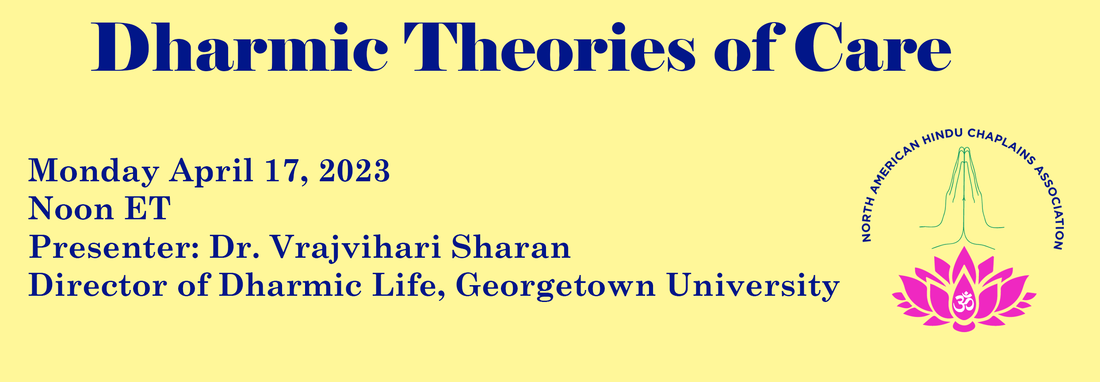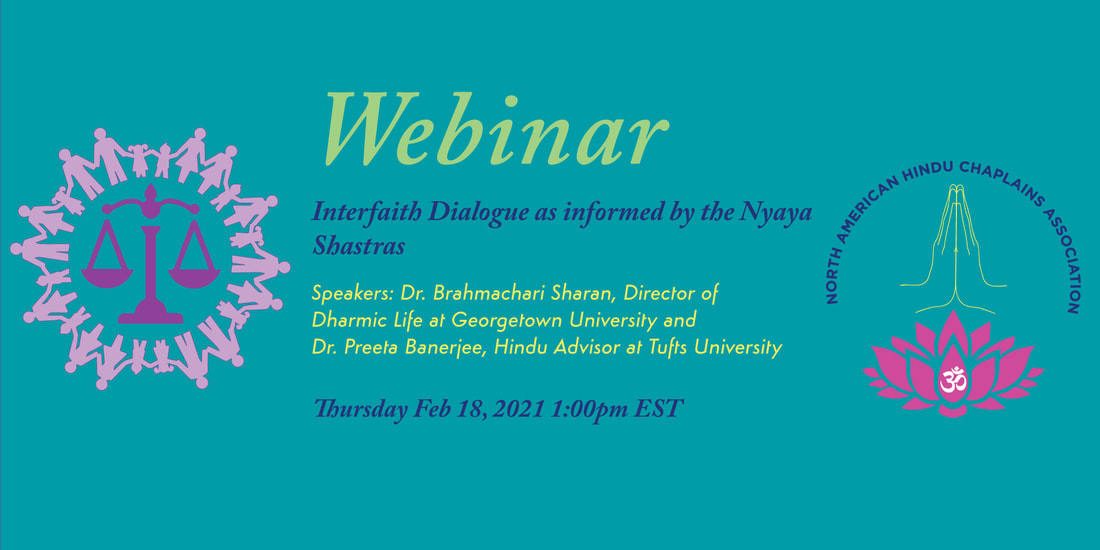Date: Noon ET Monday April 17th
Topic: Dharmic Theories of Care
Presenter: Dr. Vrajvihari Sharan, Director of Dharmic Life, Georgetown University
Dr. Sharan will offer insights on how Dharmic practices and philosophies translate into actual spiritual care situations. Open to all who are interested in developing their skills in providing spiritual care for Hindu care recipients.
Topic: Dharmic Theories of Care
Presenter: Dr. Vrajvihari Sharan, Director of Dharmic Life, Georgetown University
Dr. Sharan will offer insights on how Dharmic practices and philosophies translate into actual spiritual care situations. Open to all who are interested in developing their skills in providing spiritual care for Hindu care recipients.
An interactive session on the topic of Interfaith dialogue where NAHCA releases “Dharmic Guidelines for Interfaith Dialogue.” This document contextualizes protocols for engaging in interfaith dialogue on the basis of the Nyāya Śāstras (the science of logic). We hope that by decolonizing the premise of interfaith engagement, we will be able to equitably uplift voices that are traditionally marginalized. Previously offered protocols for dialogue often require marginalized voices to conform to default norms. We thus aspire to shift the paradigm and create a space where expansive dialogue may occur. This work is supported by the (IFYC) Interfaith Youth Core through the Racial Equity & Interfaith Cooperation Award that is a part of the We Are Each Other’s Campaign.
A conversation about how HCI and NAHCA are partnering to provide a spectrum of Hindu spiritual care in North America. HCI was founded in 2018 by SF Bay Area professionals driven by a need to develop much needed community service solutions, by integrating Hindu wisdom, knowledge of humanities and contemporary technologies. The founding principle for HCI is one of “by the community, for the community”. While open to the participation of the community at large, the special focus group for HCI services are the 60+ population and young families.
This webinar explores the following questions: As we encounter Hindu scriptures thousands of years old and apply them to our spiritually aligned activism today, how can we entertain different perspectives and various interpretations to find the underlying and timeless lessons? Can we move towards deep meaning and personal significance when we read the tales of our Gods and Goddesses? Can we encourage curiosity and can that process help us reclaim our spiritual, philosophical and psychological traditions?
There are only a handful of Hindu chaplains working in hospital settings. Hear first-hand about the work of Hindu hospital chaplains, the rigorous training and credentialing process, and how their work has changed since the pandemic arrived in the US. This is a wonderful career for those who are interested in the confluence of spirituality and medicine.
Ms. Sangeetha Kowsik, Senior Hindu Spiritual Life Advisor for NYU discusses how she channels her artistry to provide spiritual care, refute cultural biases and stigmas which allow care recipients to see their lives as worthy and precious. Diversity of forms associated with the Divine allows for a multiplicity of ways that we can identify with and connect with the Divine. By allowing for a multiplicity of ways to connect with the Divine, the Hindu chaplain can support a care recipient in diverse ways.
New to social media but want to have a presence? Have experience on some platforms but would like to expand your impact? Curious about where people are going for online content? Then this webinar is for you! Vennly co-founder and CEO Mr. Brian Landau discusses useful and creative strategies for promoting audio-based spiritual care programming on multiple platforms.
Hindu Temples in the US have historically served as both cultural and religious centers for their communities. Ritual services have been prioritized based on the desires of the diasporic community. Ritual performance is the specialism of Brahmins and Pandits. Brahmanic priests may engage in teachings but their sacred knowledge serves ritual performance in public Temples and in private homes. Moving forward, Temple managers are considering how to amplify affiliation with American born Hindus who have a very different relationship with their spiritual heritage and how to support their aging constituencies. Hindu chaplaincy offers solutions to these critical issues. Mr. Mathur is a long-time leader at the Hindu Temple of Rochester who has professional clinical pastoral education training. Based on his training, and his work at the hospitals and the Hindu Temple of Rochester, he presents case studies that demonstrate the benefits of chaplaincy practices for Hindu Temple communities and argues for enhancing it to the next level by building Temple-based trained chaplaincy support teams.
Mr. Tahil Sharma and Dr. Preeta Banerjee discuss the need for awareness, active listening and appreciative inquiry in spiritual care. They focus on creating open dialogue, particularly in Interfaith work, when power structures and cultural differences can cause unnecessary inequity and struggle.
In times of political polarization and identity conflicts, Hindu Americans are increasingly finding themselves caught between various struggles. In this webinar, Hon. Michigan Rep. Padma Kuppa and UPenn lecturer Dr. Murali Balaji discuss the history of Hindu American political activism and where Hindu Americans stand in today's American political landscape.










